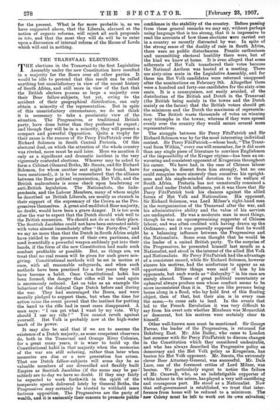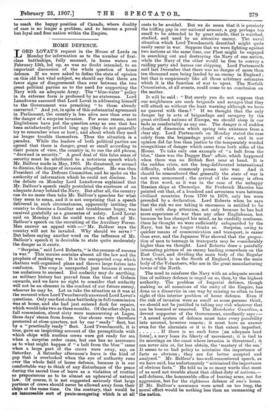THE TRANSVAAL ELECTIONS.
THE elections in the Transvaal to the first Legislative Assembly under the new Constitution have resulted in a majority for the Boers over all other parties. It would be idle to pretend that this result can be called anything but unsatisfactory in view of the recent history of South Africa, and still more in view of the fact that the British electors possess so large a majority over their Boer fellow-subjects, but yet, owing to the accident of their geographical distribution, can only obtain a minority of the representation. But in spite of this unsatisfactory circumstance, we do not think it is necessary to take a pessimistic view of the situation. The Progressives, or traditional British party, have done better than they professed to expect ; and though they will be in a minority, they will present a compact and powerful Opposition. Quite a trophy for their cause is the success of Sir Percy FitzPatrick over Sir Richard Solomon in South Central Pretoria. Of this electoral duel, on which the attention of the whole country was riveted, more must be said later. Here we mention it only as a significant and dramatic incident in the very vigorously contested elections. Whoever may be asked to form a Cabinet (General Botha, Mr. Smuts, and Sir Richard Solomon, for whom another seat might be found, have been mentioned), it is to be remembered that the alliance between the Boer political organisation, Het Volk, and the British malcontents is some check upon headstrong or anti-British legislation. The Nationalists, the Inde- pendents, and the Labour Members, many of whom might be described as British Liberals, are mostly as staunch in their support of the supremacy of the Crown as the Pro- gressives themselves. A great and undiluted Boer majority, no doubt, would have been a grave danger. It is too soon after the war to expect that the Dutch should wish well to the British connexion. We should not do so in their place. The Scottish Jacobites could not have been entrusted safely with votes almost immediately after " the Forty-five," and we say no more than that the Dutch in South Africa might have yielded to the pressure of their own partisans, and used resentfully a powerful weapon suddenly put into their hands, if the form of the new Constitution had made such conduct profitable or possible. But, as things are, we trust that no real reason will be given for such grave mis- giving. Constitutional methods will be set in motion at once, with all reasonable safeguards, and when such methods have been practised for a few years they will have become a habit. Once Constitutional habit has been formed, the danger that rifles will be used again is enormously reduced. Let us take as an example the behaviour of the disloyal Cape Dutch before and during the war. They had encouraged the Boers, and were morally pledged to support them, but when the time for action came the event proved that the instinct for putting the hand to the rifle had in most cases disappeared. A man says : "I can get what I want by my vote. Why should I use my rifle ? " You cannot revolt against yourself. Het Yolk is probably now at the high-water mark of its power.
It may also be said that if we are to assume the existence of a Dutch majority, as some competent observers do, both in the Transvaal and Orange River Colonies, for a great many years, it is wiser to build up the Constitutional habit in that majority when the memories of the war are still sobering, rather than later when memories are dim or a new generation has arisen. That our Dutch fellow-subjects will some day be as valuable members of our diversified and flexibly built Empire as Scottish Jacobites (if the name may be per witted) are to-day we have no doubt. If they may fairly be expected to work forthwith in the spirit of the temperate speech delivered lately by General Botha, the Progressives may certainly be trusted to withhold mere factious opposition. The Progressives are the party of wealth, and it is eminently their concern to promote puhlie
confidence in the stability of the country. 'Before passing from these general remarks we may say,without perhaps using language that is too strong, that it is impressive to read the accounts of how these elections were carried out in a country so recently distracted by war. In spite of the strong sense of the duality of race in South Africa, there were no public disturbances. Frantic enthusiasm and unremitting electoral hostility there were, but of the kind we know at home. It is even alleged that some adherents of Het Volk transferred their votes because the National Anthem was hooted at a meeting. There are sixty-nine seats in the Legislative Assembly, and for these ten Het Volk candidates were returned unopposed after the nominations on February 9th. Altogether there were a hundred and forty-one candidates for the sixty-tine seats. It is a consequence, not easily avoided, of the distribution of the British and Dutch in the Transvaal (the British being mainly in the towns and the Dutch mainly on the farms) that the British voters should get the minimum and the Dutch the maximum of representa- tion. The British waste thousands of votes on winning easy triumphs in the towns; whereas if they were spread evenly over the country they would secure several more representatives.
The struggle between Sir Percy FitzPatrick and Sir Richard Solomon was by far the most interesting individual contest. Sir Percy FitzPatrick—whose book, "The Trani- vaal from Within," every one will remember, for it did mons than any single piece of literature to convince Englishmen of the impossibility of the Kruger r4gime—has been an un- wavering and consistent opponent of Krugeriim throughout his career. We have bad, in the case of Chinese labour for example, to dissent from him strongly, but no one could recognise more sincerely than ourselves his upright- ness and his single-minded devotion to the welfare of South Africa. Pretoria has not unnaturally remained a good deal under Dutch influence, yet it was there that Sir Percy FitzPatrick took his chances against the allied forces of Het Volk and Nationalism. His opponent, Sir Richard Solomon, was Lord Milner's right-hand man in the reorganisation of the Transvaal after the war, and his administrative ability and the value of his services are undisputed. He was a moderate man in most things, though he was an upcompromising supporter of Chinese labour, and was often credited with having drawn up the Ordinance; and it was generally supposed that he would be a balancing influence between the Progressives and the Nationalists. Some even thought that he would bls the leader of a united British party. To the surprise of the Progressives, he presented himself last month as 6, Nationalist, and stood in the interest of the allied Het Volk and Nationalists. Sir Percy FitzPatrick had the advantage of a consistent record, while Sir Richard Solomon, however sincere his motives, had the misfortune to appear as an opportunist. Bitter things were said of bim by his opponents, but such words as " disloyalty " in his case are merely absurd. Times of great political uncertainty or upheaval always produce men whose conduct seems to be more inconsistent than it is. They are like persons being borne along in a flood, who lay hold first of this floating object, then of that, but their aim is in every case the same,—to come safe to land. In the events that led to the French Revolution it was very difficult to say from his overt acts whether Mirabeau was Monarchist or democrat, but his motives were certainly clear to himself.
Other well-known men must be mentioned. Sir George Farrar, the leader of the Progressives, is returned for Boksburg East. Mr. Abe Bailey, who came to London last summer with Sir Percy FitzPatrick to discuss changed in the Constitution which they considered undesirable, and who has always described the Progressive policy as democracy and the Het Volk policy as Krugerism, had beaten his Het Volk opponent. Mr. Smuts, the extremely clever Boer Attorney-General, was successful. Mr. Dale Lace, one of the foremost critics of Lord Milner, wad beaten. We particularly regret to notice the failure of Mr. Creswell, who, as an indefatigable supporter of white labour in the mines, has played a very self-sacrificing and courageous part. He stood as a Nationalist. Now that self-government is established, we trust that inter- ference from home will be reduced to a minimum. The new Colony must be .left to work out its -own salvation;
to reach the happy position of Canada, where duality of race is no longer a. problem, and to become a proud but loyal and free nation within the Empire.











































 Previous page
Previous page